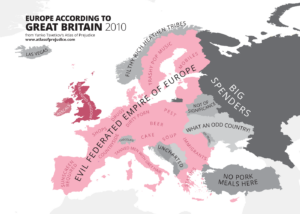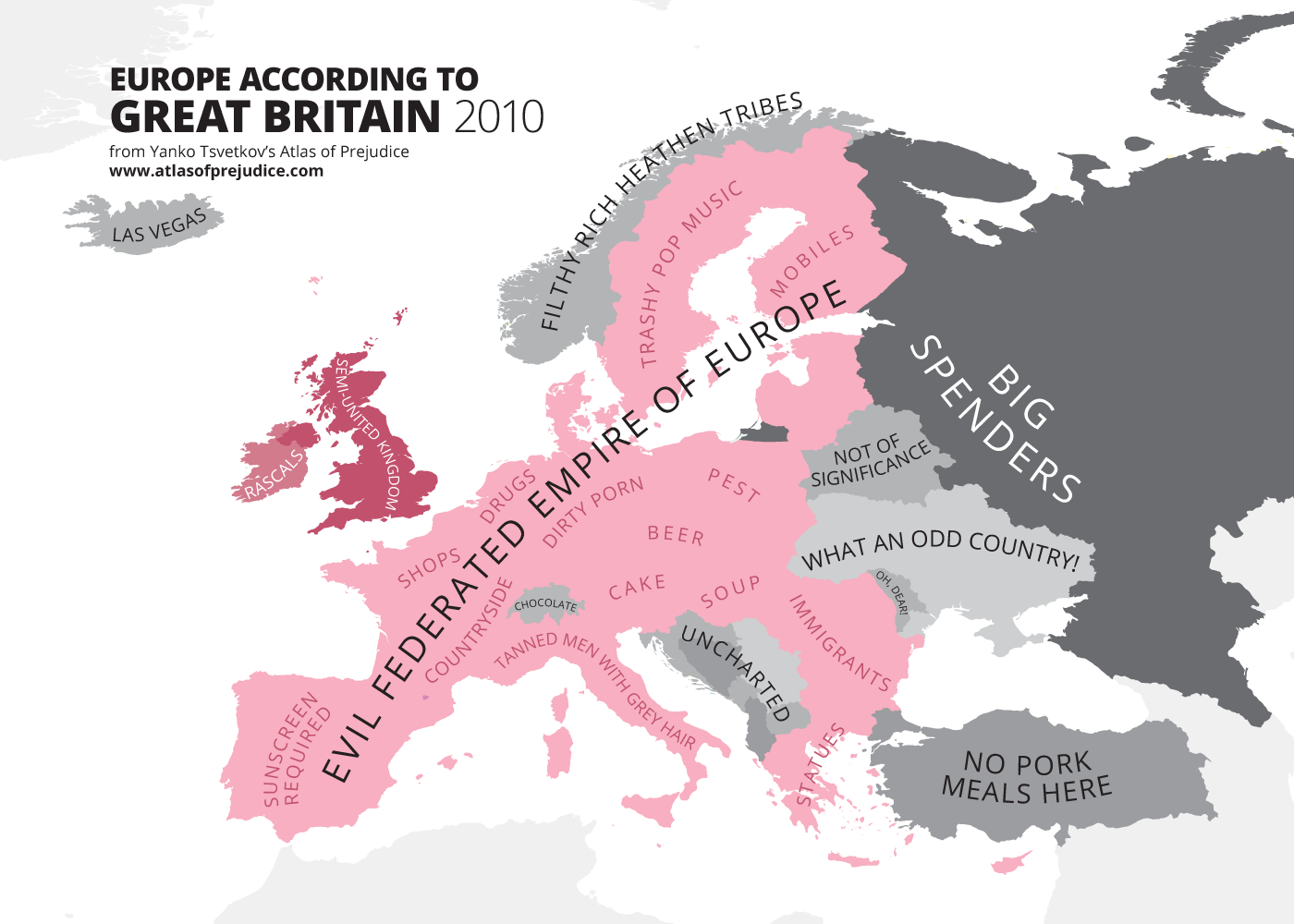How to describe Italians? Or French? Many people come up with similar associations: Distant Germans, polite Brits,… Some claim a kernel of truth in these national stereotypes, while others warn about the dangers of prejudice. How accurate are national stereotypes? How does it feel to be confronted with one? Our author Marlene asked young people from Europe – leading to an own “Geography of Stereotypes”.
When the Internet Calls You Grumpy
The algorithm knows what’s on your mind. This was eerily accurate while I was scrolling through Instagram one day. A reel caught my eye: Influencer Uyen Ninh spoke about her life as a Vietnamese living in Germany. An interesting find, given I was in the middle of my research for this article’s topic, national stereotypes. Ninh’s verdict on my home country was not particularly kind. “If you ever visit Germany, you might notice that many people over here seem quite grumpy and distant,” she told her followers in a video that compared Germans to Brits. I found her words somewhat offensive. Of course, I knew she was just speaking about her personal experience with culture clash, a topic I could relate to. Still, I felt judged by this stranger on the internet.
Different Places, Different Social Codes

On social media, Uyen Ninh speaks about her life as a Vietnamese in Germany. Sometimes this leads to debates about stereotypes (Photo: Screenshot of Uyen Ninh’s Instagram Channel)
At the same time, I could understand where she was coming from. It is only natural that people from different countries share different social codes regarding what is considered friendly and hospitable. But her post must have struck a nerve, not only in me. Many Germans in the comments responded emotionally to being stereotyped as grumpy. “You came here, but all you do is complain and talk badly about this country! I think it’s really rude”, wrote one follower. “We as a culture decided being fake nice is not actually nice,” defended another German. Still, many agreed with the Vietnamese: “I don’t mean to be rude, but compared to the Germans, the Brits are more pleasant and fun to be around.” According to the comments, the stereotype that Germans are unfriendly was more common than I had expected.
A Box Which Does Not Fit
When I think about German stereotypes, a list like this comes to mind: overly rule-abiding, reserved, punctual, serious, well-organized, and efficient. As someone who values friendliness and spontaneity, I know that these stereotypes do not accurately describe most Germans. Feeling wrongly perceived a certain way is something others can relate to. Asking Emma (20), a German university student living in the UK, she said: “I don’t really like stereotypes because I often feel squished into a box I don’t belong in.” However, posts like Ninh’s, which receive ten thousand likes, make me wonder how people outside my culture see me. This subject affects all social groups. One can easily write a list of stereotypes for any country. So, how do others deal with stereotypes? I interviewed young people of different nationalities to find out.
National Stereotypes Around the World
Click on the dots to see more (all photos used in this map are private).
Click on the button to load the content from view.genially.com.
The interviewees took stereotypes seriously if it came to personality aspects. During his travels in Europe for example, Matthew (21) saw himself confronted with various prejudices against the US: “lazy, backward-thinking, fat, fake, and maybe a bit stupid.” Although these stereotypes frustrated him at times, he still tried to disprove them:
While stereotypes have the potential to be insulting and promote discrimination, they do not always have to be harmful. When a stereotype involved food culture or clothing, the interviewees did not perceive it as offensive and even agreed in parts. Sabina (21) from Czechia admitted: “Since the Czechs drink the most beer per capita in the world, I think this stereotype is accurate.” Freya (22) thought the same about tea consumption in England. The overall guide on how to use stereotypes in a non-offensive way seems to be: Focusing on small details instead of making general statements about personality.
Using National Stereotypes Responsibly

Some people perceive stereotypes about fashion styles or foods less negatively than about personality aspects (illustration: pixabay/mustachioed_pizza)
This strategy is also successful on social media, where content about national stereotypes has become lucrative. In most posts, influencers like Uyen Ninh and others include national stereotypes without causing controversy. Clips about the lack of small talk at the supermarket check-out or the amount of bureaucracy in Germany reach millions worldwide and cause far less criticism than videos about “grumpy” Germans. The difference is that these comedic sketches focus only on small parts of everyday life. In contrast, so-called “real talks” about more serious issues of living abroad could potentially put an entire country in a bad light. There is no time to contextualize a negative experience in a video on TikTok or Instagram. Therefore, content about the downsides of life in a particular country is better off on platforms that allow longer formats, like YouTube. Handling stereotypes responsibly is essential because influencers have power over a country’s image, especially for young people, who make up the majority of users on social media.
The Famous Kernel of Truth
But what is it about this type of content that attracts such a large, primarily young, audience? When you look at the comments under Ninhs’ or similar influencers’ posts, the answer to this question seems obvious: It feels relatable. Many followers believe stereotypes are at least partly true. They share travel stories in the comments and get excited when content creators talk about funny experiences they can relate to. I also enjoy hearing people’s travel anecdotes and love discovering that others made similar observations abroad. When others validate my experiences, it fosters a sense of community in me. But just because thousands of people on social media have similar stereotypes about a place, does it make it more accurate? How reliable are people’s observations about other countries?
To be or Not to be Accurate
Over the past decades, scientists have sought to determine the accuracy of national stereotypes. Although it is hard to find a reliable psychological method, researchers nowadays can say with certainty that stereotypes lack accuracy. According to studies, the differences in personality within a country are ten times larger than between countries. So, even if many Germans appear reserved at first glance, millions of other Germans value being open and hospitable towards strangers. At the same time, hundreds of millions worldwide are just as reserved or open as some Germans.
A Human Weakness
Even psychologists perform just as badly as non-experts when ranking countries after personality traits. But why do humans seem incapable of forming accurate stereotypes? Research shows that this is partly because the differences are not significant enough. At the same time, most people do not know people from different countries well enough to notice subtle psychological differences. Content on social media might magnify certain stereotypes. However, it might also be an opportunity to connect people worldwide. Getting to know each other is the key: Like nationality, differences between people of different gender or age are just as minor. Still, people are usually more accurate in their assumptions because they spend more time together. Of course, even here, stereotypes are often highly exaggerated, though not as much as they are across cultures.

Stereotypes about countries illustrated in the book “The Atlas of Prejudices” (Photo: Yanko Tsvetskov / alphadesigner.com)
The Evolution of Differences
People around the world are very similar to each other. But they are not the same. Some scientists believe slight differences in personality between countries exist partly because of genetics. In the past, people who were open to risks were more likely to migrate. They thus were overrepresented in regions “on the frontier of exploration”. As more outgoing people emigrated, isolated areas became more introverted over time. Studies about the Italian archipelagos discovered, for example, that its inhabitants were less extroverted and open-minded but more climate-conscious and emotionally stable than the mainland. Other environmental factors that influence personality include lack of sunlight, population density, and risk of infection. Studies have shown that less extroverted and open people had a better chance of survival in regions where the latter were relatively high. There is also a self-perpetuating effect: People are usually drawn to places with people who are already similar.
Simply Not Enough
Although countries may have slight differences in average personality, these differences say nothing about the individual; the overlap between countries is too considerable. The problem with national stereotypes is that they are mostly inaccurate and focus on very few traits, such as “reserved.” To do justice to someone’s character, it is necessary to use a collection of many characteristics, such as the Big Five or Hexaco questionnaire, frequently used in psychological research.
A Matter of Perspective
Research teaches us that getting to know each other can dismantle most national stereotypes. Matthew experienced this himself during his travels outside the US.
However, spending time in another country and getting to know its people is sometimes not enough. It is necessary to develop a deeper understanding of a particular culture and its social habits to break some stereotypes, as the example of “grumpy” Germans shows. Of course, taking off one’s culturally tinted glasses is hard before forming an opinion. Putting aside the social codes one grew up with may only partially be possible. But it is essential to truly understand another culture before judging it. As always, it depends on the perspective. Even if Germans appear “grumpy” in some people’s eyes, stereotypes might tell you more about the spreader than the target.





